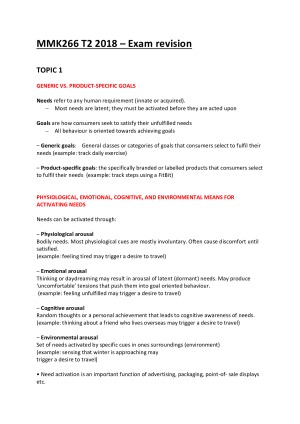MMK266 Consumer Behaviour Notes
Subject notes for Deakin MMK266
Description
Clear, detailed, organised notes. Includes the following concepts: •Absolute vs. differential threshold •Actual self-image, ideal self-image, social self-image, and ideal social self-image •Adoption vs. diffusion •Cognitive dissonance •Continuous vs. dynamically continuous vs. discontinuous innovations •Different positioning strategies •Different ways to measure social class •Economic vs. passive vs. cognitive vs. emotional models of decision making •Elaboration Likelihood Model •Enculturation vs. acculturation •Extended self and the four ways that products can become part of the extended self •Extensive problem solving vs. limited problem solving vs. routinised-response behaviour •Fear appeals and their components •Features of consumer innovators •Four functions of the family •Generic vs. product-specific goals •Inner- vs. outer-directed consumers •Involvement •Marketing-created reference groups •Perceived risk •Physiological, emotional, cognitive, and environmental means for activating needs •Properties of culture (satisfies needs, is dynamic, is learned, is shared) •Stimulus generalisation vs. stimulus discrimination •Superordinate vs. focal vs. subordinate goals •Teleological vs. deontological theories of ethics •Theory of Planned Behaviour and its components •Tricomponent model of attitude •Unconscionable lies vs. claim/fact discrepancies vs. claim/belief discrepancies •Visualisers vs. verbalisers
Deakin
Semester 2, 2018
20 pages
3,887 words
$29.00
6
